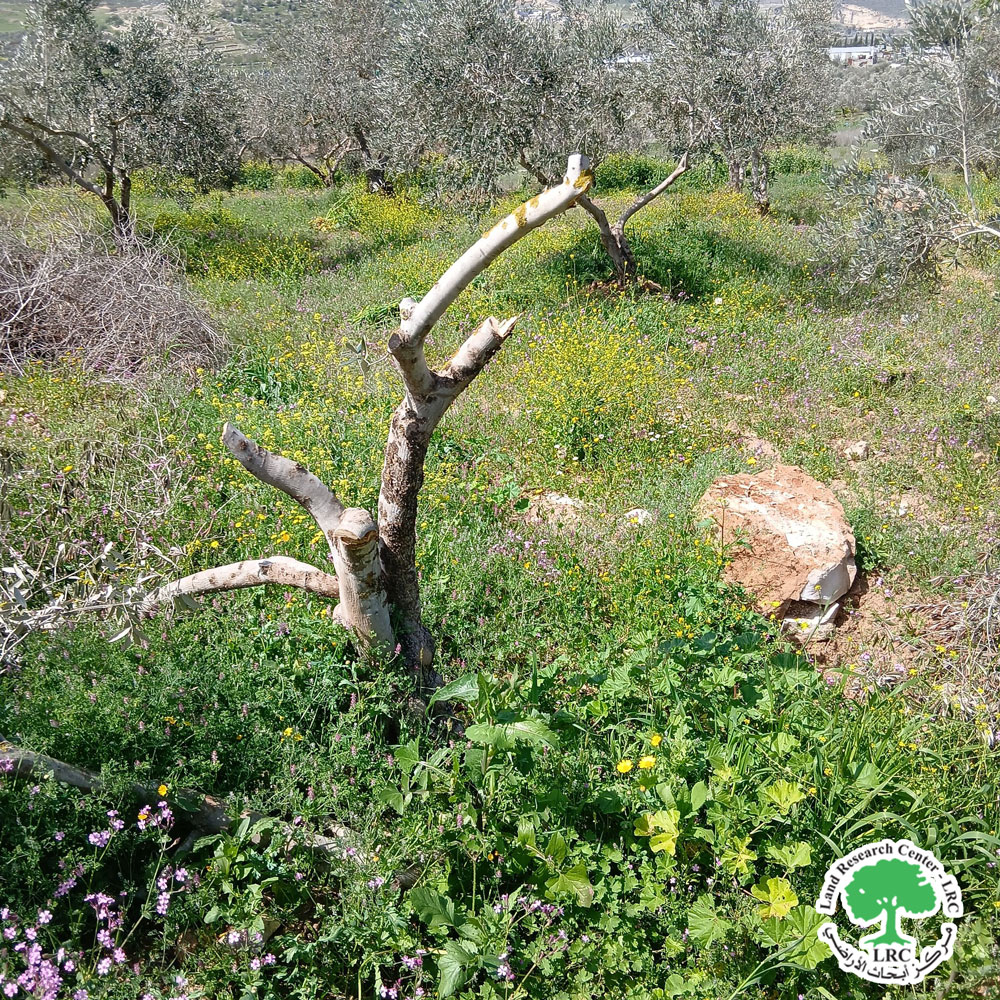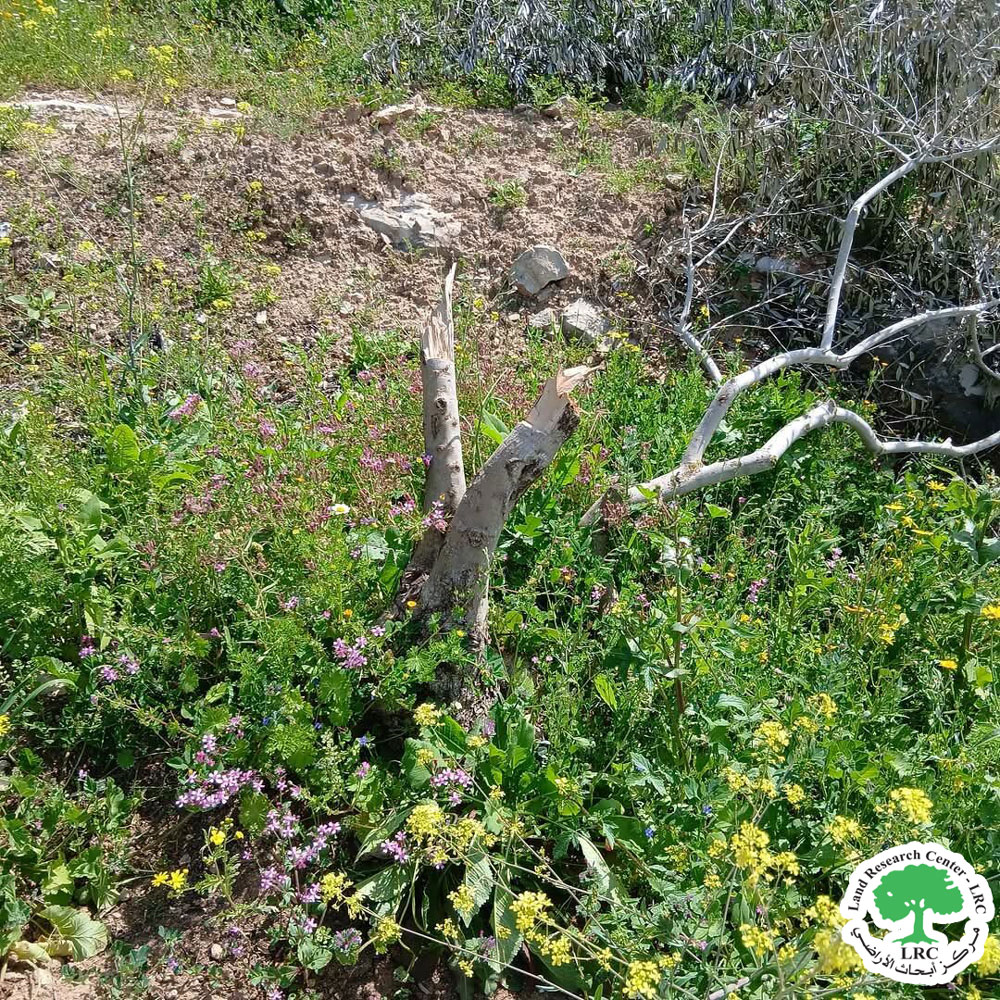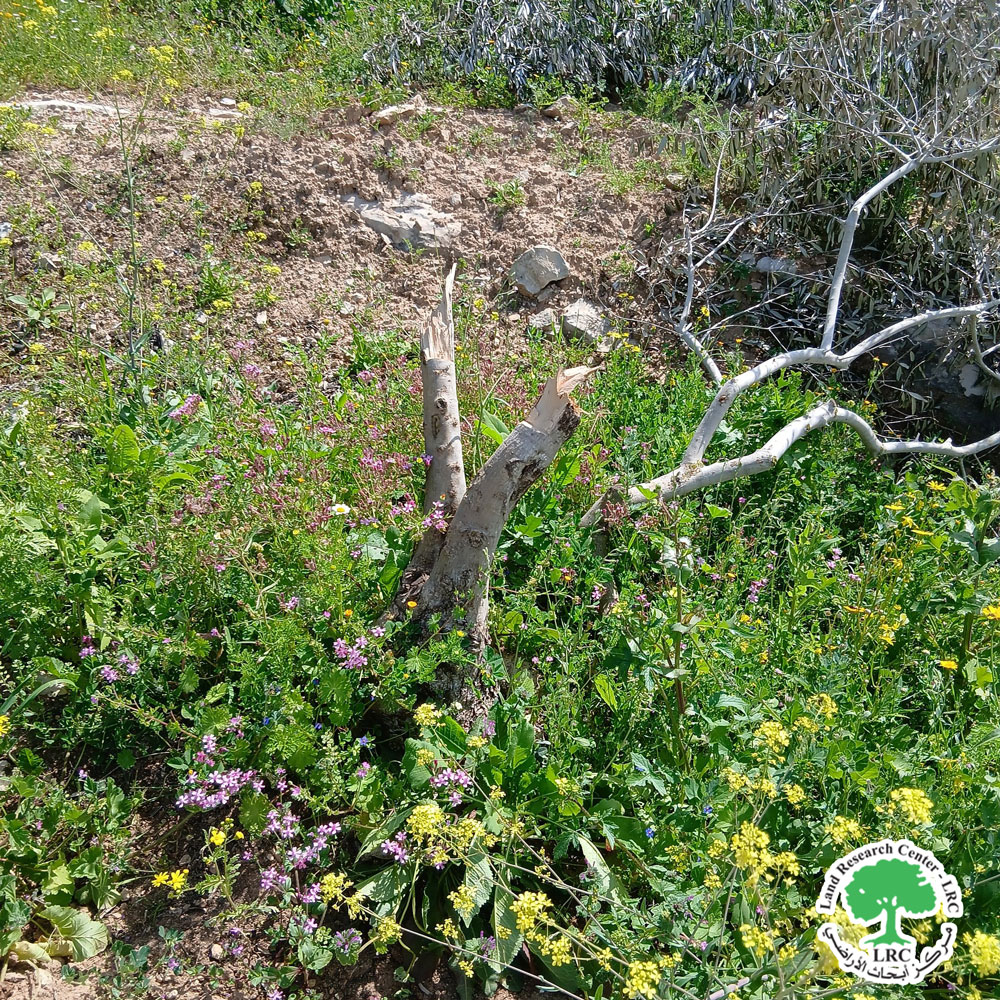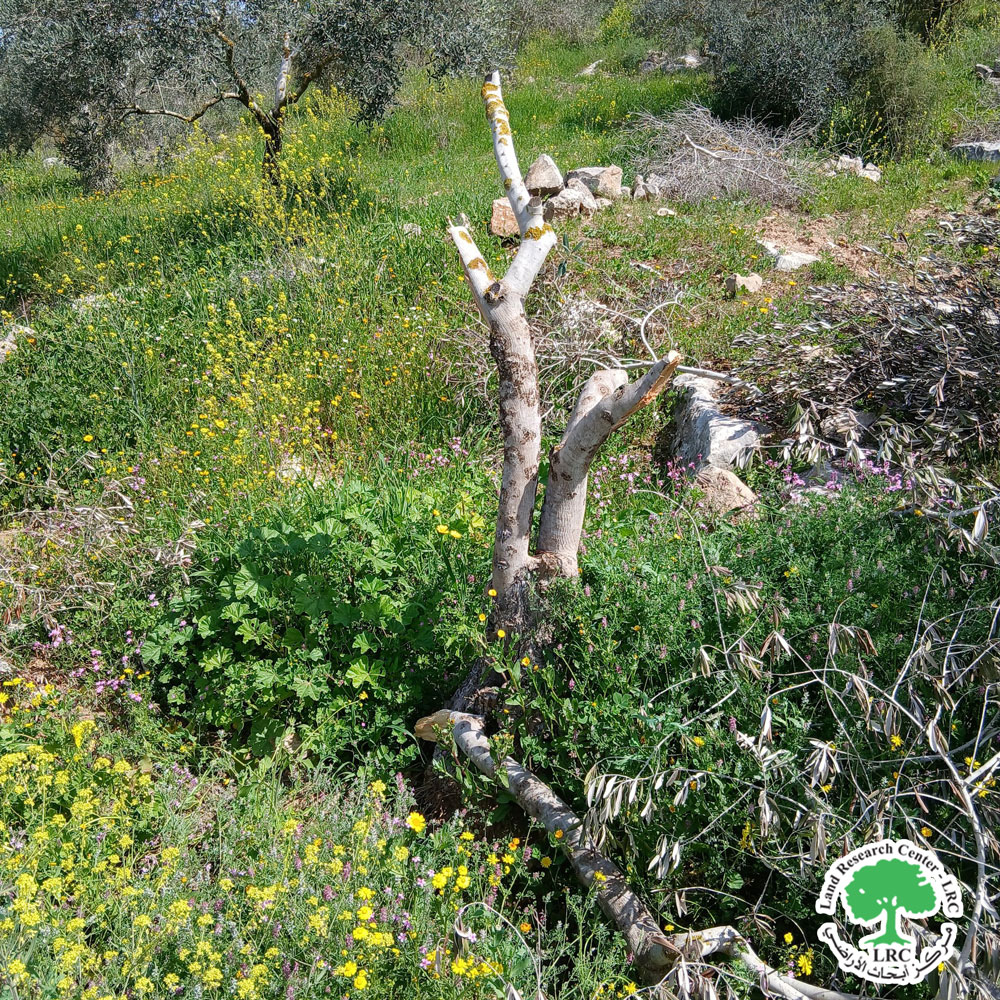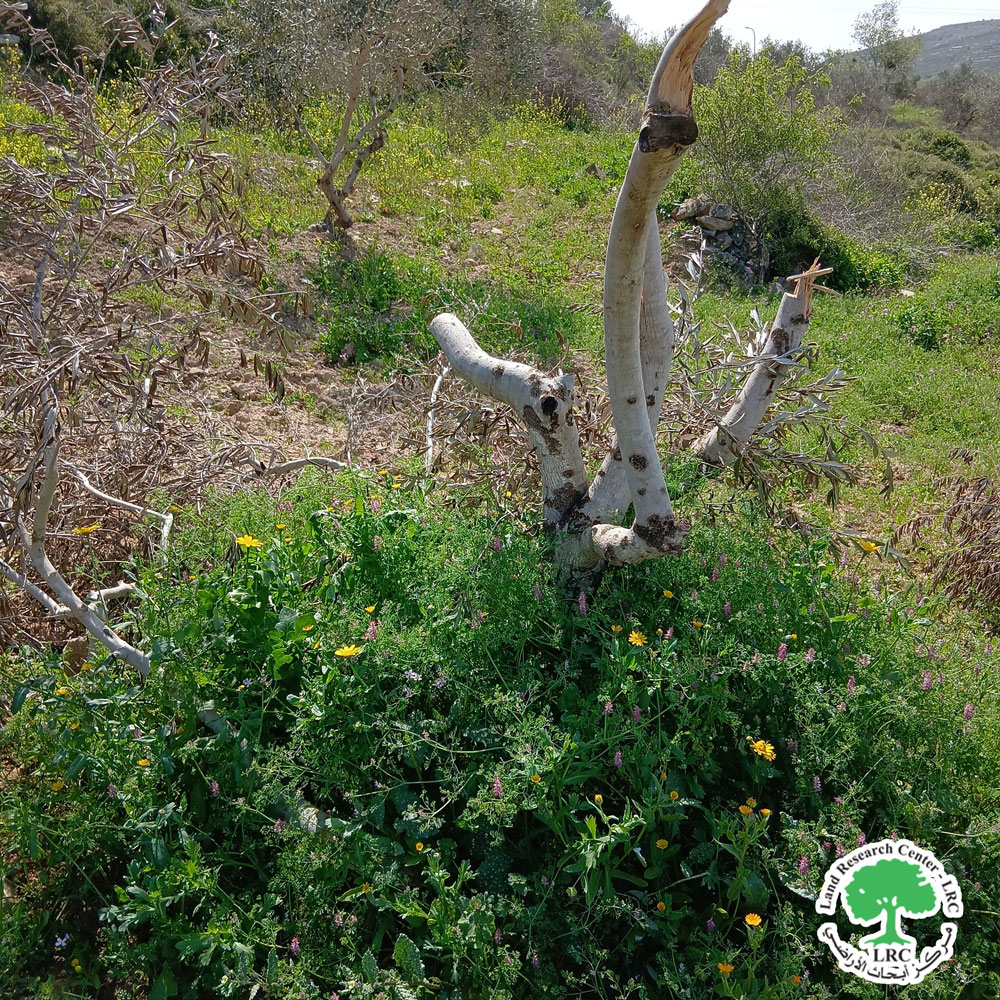Settlers from "Shavei Shomron" cut down 32 fruitful olive trees in the village of Deir Sharaf, north of Nablus
Violation: Cutting and damaging 32 fruitful olive trees.
Location: Deir Sharaf village / North of Nablus.
Date of Violation: 16/03/2025.
Perpetrators: Shavei Shomron settlement.
Affected Party: Farmer Yaqub Ahmad Yaqub Antari.
Description:
On the afternoon of Sunday, March 16, 2025, the northern lands of Deir Sharaf village, north of Nablus, witnessed ongoing settler attacks originating from the "Shavei Shomron" settlement, which is built on parts of the village's land.
A group of settlers from the settlement raided a plot of land in the early afternoon, located in the area known as "Qattan Al-Bayadah," within Parcel No. 12, Plot No. 10 of the village’s northern lands, approximately one kilometer from the "Shavei Shomron" settlement.
Using sharp tools and electric saws, the settlers cut and severely damaged 32 olive trees by extensively sawing their branches, causing significant harm to the trees. The affected olive trees are planted across an eight-dunum area and belong to farmer Yaqub Ahmad Yaqub Antari, a resident of Deir Sharaf and the sole provider for a family of five, including two daughters and three young children.
According to the testimony of the affected farmer, his land is located between the mentioned settlement and the pastoral outpost established on the lands of the neighboring village of Ramin. He pointed out that the area has been witnessing increased settler activity. He added:
"Recently, there has been intense settler activity near my land and on the outskirts of the village. Settlers have been using tractors to roam between the olive fields, provoking farmers. That evening, I happened to visit my land and found that the settlers had cut the branches of 32 trees out of 60, causing direct damage to them. They also vandalized the land I own. The trees are 35 years old and the land is a source of olive oil production for me every season. I personally hold the settlers responsible for this act of sabotage because they are the only ones who benefit from destroying the land. There is also a clear history of similar acts of vandalism by settlers in the area, where olive trees have been cut multiple times around my land, using the same method."
The field researcher has documented several incidents where settlers have raided lands and cut down olive trees in villages north of Nablus, specifically in Sebastia, Deir Sharaf, Al-Naqoura, and Ramin. The inevitable result of these violations has been the theft of dozens of agricultural dunams, some of which were bulldozed, in addition to the cutting of dozens of fruitful olive trees in those areas.
Introduction to Deir Sharaf Village:
Deir Sharaf village is located 7 km northwest of Ramallah. It is bordered to the north by the villages of Burqa and Ramin, to the west by the village of Beit Lid, to the east by the villages of An-Nakoura and Sebastia, and to the south by the villages of Qusin and Kafr Qaddum.
The population of the village is 2,949 people as of 2017. The total area of the village is 7,745 dunams, of which 403 dunams are designated as the built-up area of the village.
Israeli settlements have seized 265 dunams of the village's land. Part of the village's land is occupied by the "Shafei Shomron" settlement, which was established in 1977 and has confiscated 265 dunams of village land, housing 604 settlers.
Additionally, the bypass roads No. 60 and No. 557 have confiscated more than 823 dunams of land.
According to the Oslo Agreement, the village's land is classified into Areas B and C. Area B makes up 20% of the land, while the larger portion, Area C, is under full Israeli control and constitutes 80% of the total land area. The areas are as follows:
- Area B: 1,540 dunams
- Area C: 6,206 dunams
Legal Commentary:
The Palestinian environment, in general, is subjected to numerous environmental violations by the Israeli occupation, disregarding all international and national laws and conventions related to the protection of environmental rights. The right to live in a clean and healthy environment is a fundamental human right that has been inherent to mankind since the beginning of creation. The occupation often attempts to present itself as being concerned with international environmental issues, despite having signed major environmental protection agreements, such as the Basel Convention in 1989, the Rotterdam Convention in 2008, the Stockholm Convention in 2001, and the Ramsar Convention in 1971, as well as air quality and climate protocols. Nevertheless, Israel continues to violate all of these treaties without accountability or oversight.
In addition to the provisions regarding the right to enjoy a clean and healthy environment for all those under military occupation according to international laws, conventions, and treaties, such as the International Covenant on Economic, Social, and Cultural Rights, adopted by the United Nations General Assembly in Resolution 2200A (d-21) on December 16, 1966, in Article (1), paragraph (2): "...All peoples, in pursuit of their own objectives, have the right to freely dispose of their natural wealth and resources without prejudice to any obligations arising from the international economic cooperation based on the principle of mutual benefit and international law. In no case shall a people be deprived of its means of subsistence...".
Undoubtedly, the violations carried out by the Israeli occupation contradicts with the laws of the occupation state itself before any other laws. Referring to the details of this case, the Israeli Penal Code of 1977 and its amendments stipulate that trespassing on someone else's property to commit a criminal act punishable by law is an offense. By reading Article 452 of the Israeli Penal Code, we find that the law punishes those who commit an offense or cause damage to property such as (a water well, a water reservoir, a dam, a floodgate, planted trees, a bridge, a tank, or a water cistern) with a penalty of five years imprisonment.
In addition to, Article 447 of the Penal Code states: "Anyone who does any of the following with the intent to intimidate, insult, or harass the property owner or commit a crime shall be punished by imprisonment for two years:
(1) Enters or crosses the property;
(2) After entering the property legally, remains there unlawfully.
(b) A crime is committed under this section if the offender carries a firearm or a cold weapon, and the punishment is imprisonment for four years."
By reading the text of this article, we find that the Israeli Penal Code criminalizes the mere act of entering someone else's property without permission, with the intent to insult, harass, or intimidate, and punishes this act with two years of imprisonment. The punishment increases to four years if the offender commits any act on someone else's property using a weapon or a sharp tool, referred to as a "cold weapon." This is explicitly criminalized in the text of Article 447 of the aforementioned Israeli Penal Code. Additionally, a penalty of 5 years imprisonment is imposed on those who cause damage to property mentioned in Article 452. Therefore, the violator, the "settler," should face a compounded violation: the first for entering a property that is not theirs, and the second for trespassing on and cutting down the planted trees, resulting in environmental harm.
Therefore, the Israeli aggressor blatantly violates both international laws and treaties, as well as the internal laws of the "occupying state," in a clear violation. Consequently, the "Israeli judiciary" must hold the settlers accountable and punish them for these actions based on the provisions of their own laws. However, there is no legal accountability for the aggressors by the Israeli judiciary. Despite this, every human being on this earth has the right to live in a clean, healthy, and safe environment, free from any violation or aggression against it.
مشروع: حماية الحقوق البيئية الفلسطينية في مناطق "ج" SPERAC IV - FCDO
Disclaimer: The views and opinions expressed in this report are those of Land Research Center and do not necessarily reflect the views or positions of the project donor; the Norwegian Refugee Council.
إخلاء المسؤولية: الآراء ووجهات النظر الواردة في هذا التقرير هي آراء ووجهات نظر مركز أبحاث الأراضي ولا تعكس بالضرورة وجهات نظر أو مواقف الجهة المانحة للمشروع؛ المجلس النرويجي. للاجئين
